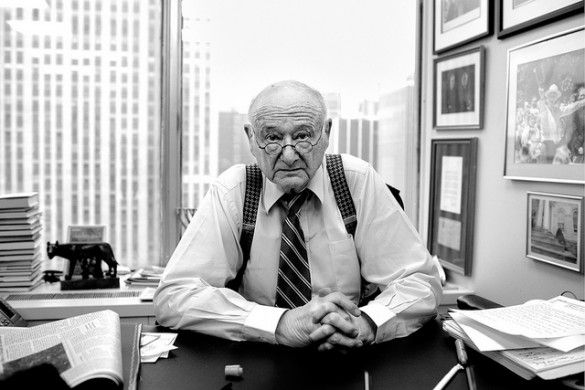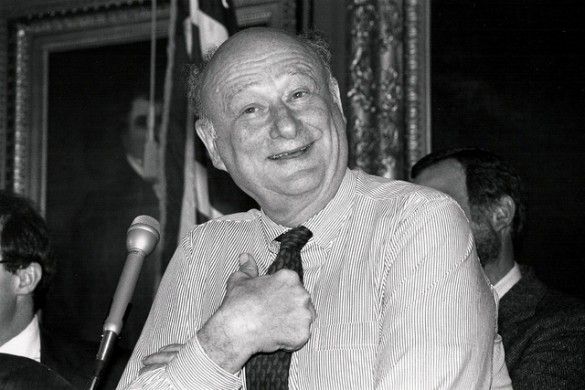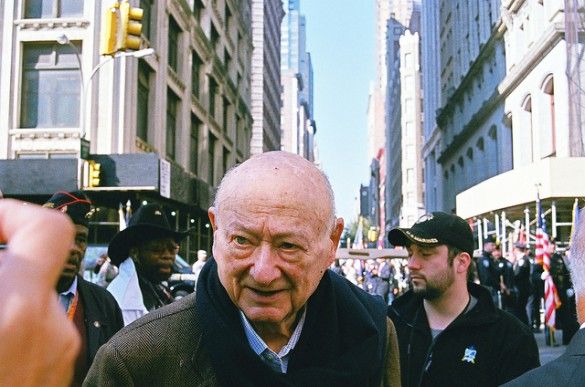Op-Ed: My Personal Experiences With Ed Koch

Of all the elected officials I have known personally — with the exception of former Congressman Stephen Solarz for whom I once performed an internship during his first term as assemblyman for the 45th Assembly District — I’ve had the most personal contact with our former mayor, Ed Koch.
My First Encounter
It was 1969. One year before my college internship with Solarz. Unsurprisingly, I chose transportation as my topic for a political science school paper at Hunter College, where I did my undergraduate work. I wanted to write about what the federal government was doing to improve mass transit and someone suggested I see the local congressman whose office was located on Second Avenue, in the upper seventies. I was skeptical of obtaining any information because I did not reside in the “silk stocking” district, as the Upper East Side was then called. I was told that the congressman’s name was Ed Koch, a name I had never heard before. I was told he was active in introducing legislation to help mass transit and that’s why I should see him.
Since his office was not that far from school, I figured it was worth a shot. Being a kid, I knew nothing about making appointments or calling in advance. In those days most politicians only interacted with their constituents through their local political clubs. Storefront offices were most unusual. I located the office, a dilapidated looking storefront, with a sign above it indicating it was Congressman Ed Koch’s neighborhood office. Inside, there was only one person, a tall balding gentleman in his mid-forties but looking older, sitting at an empty desk staring out the window. He immediately greeted me, introducing himself as Congressman Ed Koch and asked how he could help me. I was waiting for him to ask me where I lived and expected him to tell me to leave once I informed him I resided in Brooklyn, directing me to my own congressman. He never asked.
I told him I was a student and wanted to learn about mass transit legislation for a school paper. He went to his file cabinet and after a brief search pulled out about 50 pages. He explained to me which were laws and which were legislation he introduced and what they intended to accomplish. I figured I had to hand copy what I was interested in. He said that wouldn’t be necessary and walked over to the photocopy machine and proceeded to make copies for me, which was more difficult than it sounds. In those days photocopying was a slow and tedious process. Each page took approximately 10 seconds to copy and they came out wet and needed a few seconds to dry before placing one sheet above the other. There also was no such thing as an automatic feeder. Each sheet had to be placed into the copier individually and be removed before the next sheet could be inserted. Since automatic collating had not been invented yet or was not in widespread use, care had to be taken also not to mix up the order of the sheets. The entire process took about 30 minutes. I did not know if he even had a secretary or perhaps she was out to lunch. Anyway, I sat comfortably and waited while Ed Koch stood at the machine and copied each individual sheet for me. The paper was a success.

My Second Encounter
I started my first full time non-summer job on the last day of 1973 as a planner at the Department of City Planning. Regular readers know that I studied and developed bus routing proposals for Southern Brooklyn, some of which were implemented in 1978. However, I also had other duties. One was to contribute to the mayor’s report, “A New Direction in Transit.” I volunteered to write a chapter on fares and transfers and was asked to write another suggesting Staten Island transit improvements. The book took about six months to finish. All the planners who contributed were invited to celebrate its completion at a private party in Ross Sandler’s apartment in Greenwich Village, one of the report’s co-editors and future commissioner of New York City’s Department of Transportation.
I happened to be standing near the inside of the apartment door when someone opened it for the next arriving guest who unexpectedly happened to be the Mayor of the City of New York, Ed Koch. The woman invited Mr. Koch in and informed him, “This is Allan Rosen.” Then she looks at me and says, “Mr. Rosen, this is Mayor Ed Koch” which I thought was strange because, who did not know the current mayor? We both greeted each other.
Mr. Koch thanked everyone who participated in helping him prepare the report and spent the rest of the evening having personal conversations with the attendees, which expectedly revolved around politics. Not being political, I did not have that much to say to the mayor. The only other thing I remember from that evening was that the “F” word appeared at least three times in every sentence during those private conversations, and wondering how he managed never to forget himself when speaking publicly. He did not have kind words for former Mayor Lindsay’s housing policy.

Another Encounter
I attended one of Mayor Koch’s famous town hall meetings and was impressed with his total honesty. The meeting was in midtown Manhattan and the crowd was starting to get hostile. One man from Washington Heights questioned the mayor’s policy regarding taxes on parking garages. He asked why the parking tax was eight percent in the other boroughs, but 14 percent in Manhattan. He said he could understand a higher tax for midtown, and rightly claimed Washington Heights was more like the outer boroughs than midtown, and so the tax should be eight percent, not 14 percent.
I could not imagine how Koch would answer that question. He responded that it was indeed unfair, but he had no plans to change it because the city — being in the midst of a budget crisis — needed the money. He made no promises to study the situation, a typical political response. The hostile crowd was just speechless. No one expected that response or knew how to refute it. He then went to the next question.
The Real Man
I once counted that I had personally seen or spoken with Ed Koch on approximately eight occasions, a few of which were just handshakes when meeting him in the street, but one encounter showed me the type of person he really was. It was around June, 1981, and I had been at my job with the MTA for four months. Although I was stationed in East New York, I chose that day to make a trip to the now closed Hudson Bus Depot at the foot of 14th Street and the Hudson River. I was given a car to commute to and from work, but I still had to use mass transit to travel most times between work locations. When it came time to return to Brooklyn, Lower Manhattan was experiencing a blackout south of 14th Street. I had to take buses and walk from the depot to the Brooklyn Bridge, and then walk over the bridge to board a subway for the remainder of the trip back to East New York. As I began my walk over the bridge, I heard a familiar voice. I looked to my right and saw Mayor Ed Koch standing right next to me asking everyone to follow him over the bridge, encouraging us all by asking that we think positive. Naturally, he was surrounded by a half dozen cameras and newspaper personnel. About a quarter of the way over the bridge, he heard some huffing and puffing behind him. He turned around and noticed a woman in her late seventies or early eighties. He asked the woman what she was doing. She responded that he had asked everyone to follow him over the bridge and she was complying. The mayor responded, “But Madam, I wasn’t referring to you.”
Then he turned around and walked back with her to Manhattan informing the media to stay where they were, and that he would return shortly. Naturally curious, and being much younger, I decided to follow him and the woman back to the beginning of the bridge to see exactly what he had in mind. When we got there, he ordered the next car going over the bridge to stop, by waving his hands. Then he said to the driver, “I want you to take this woman over the bridge and leave her at the other end.” The driver had to comply. After all it was the mayor giving the order.
He then proceeded to walk back to where the media was waiting and continued the journey, never informing them of his good deed. No one questioned him about where he had gone or what he did as we continued over the bridge. He spoke the entire time and the media took notes. Another politician would have used that incident to his political advantage by wanting it on film. Not Ed Koch. His only motive was to help that elderly woman. Until now that was just something only two or three of us knew about.
Ed Koch was indeed a rarity in politics — brutally honest, not corrupt, although there were corruption problems in his administration during its third term. He was a genuinely good person, a unique individual, and he will be missed.
Manhattan Beach resident Allan Rosen writes a column for Sheepshead Bites called “The Commute.” He is a former Director of MTA/NYC Transit Bus Planning (1981).
Disclaimer: The above is an opinion column and may not represent the thoughts or position of Sheepshead Bites. Based upon their expertise in their respective fields, our columnists are responsible for fact-checking their own work, and their submissions are edited only for length, grammar and clarity. If you would like to submit an opinion piece or become a regularly featured contributor, please e-mail nberke [at] sheepsheadbites [dot] com.



